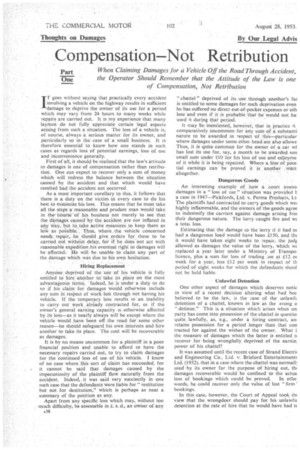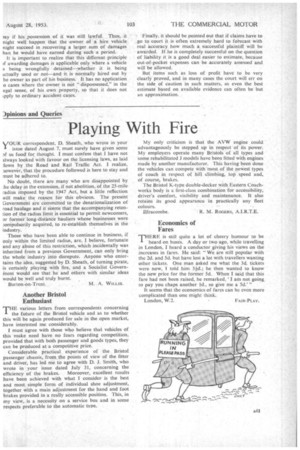Compensation—Not Retribution
Page 56

Page 59

If you've noticed an error in this article please click here to report it so we can fix it.
Part One When Claiming Damages for a Vehicle Off the Road Through Accident, the Operator Should Remember that the Attitude of the Law is one of Compensation, Not Retribution
If goes without saying that practically every accident involving a vehicle on the highway results in sufficient
damage to deprive the owner of its use for a period which may vary from 24 hours to many weeks while repairs are carried out. It is my experience that many laymen do not fully appreciate certain legal aspects arising from such a situation. The loss of a vehicle is, of course, always. a serious -matter for its owner, and particularly so in the case of a small business. It is therefore essential to -know how one stands in such eases as regards loss of potential earnings, loss of use and inconvenience generally.
First of all, it should be realized that the law's attitude to damages is one of compensation rather than retribution. One can expect to recover only a sum of money which will redress the balance between the situation causedby the accident and that which would have resulted had the accident not occurred.
As a most important corollary to this, it follows that there is a duty on the victim:in every case to do his best to minimize his loss. This means that he must take all the Steps a' reasonable and prudent man would take in the-COufse 'of his business nOt merely to see that the damages caused by the accident are not inflated in , .
any way, but to take Activemeasures to keep them as IOW as.'pO;sible,', •Thus,. where the vehicle concerned needs, repair,. he' Should give .orders 'for these to be carried out without-delay, for if he does not act with reasonable expedition,his eventual right to damages will he affected:He will. be unable-to claim. any part of the damage which was due to his own hesitation.
Hiring Replacement
Anyone. deprived Of the -useOf his vehicle is fully entitled to hire-another to take itS place on the most advantageous terms, Indeed, he is Under a duty to do so if his claimfor damages would otherwise include any sum in respect of work lost through not having his vehicle. If the temporary loss results in' an inability to carry out work , altiady contracted for, or if the owner's general earning capacity is otherwise affected by its loss—as it nearly always will be except where the vehicle Would have been off-the road for some other reason—he should safeguard his own interests and hire another to take its place. The cost will be recoverable as damages.
it is by no means uncommon for a plaintiff in a poor financial position and unable to afford to have the necessary repairs carried out, to try to claim damages for the continued loss of use of his vehicle. I know of no case where this sort of claim has succeeded, for it cannot be said that damages caused by the impecuniosity of the plaintiff flow naturally from the accident. Indeed, it was said very succinctly in one such case that the defendants were liable for" restitution but not for destitution," which is perhaps as neat a summary of the position as any Apart from any specific loss which may, without too much difficulty, be assessablein E. s. d., an owner of any A38
"chattel" deprived of its ..use, through another's fai is-entitled to some damages for such deprivation even he has suffered no direct out-of-pocket expenses or oth loss' and Oral if it is probable that he 'would not ha.
used it during that Period. '
It may 'be Mentioned, however, that in practice it comparatively Uncommon for any Surn of a substanti nature to be awarded in respectOf this—particular where damages under Some othei head au. alsOallowe Thus, it is quite common for the. c■wner of -a car wt has lost its Use for, say, a month to he awarded: son small sum under .e10 for his loss of use and enloyme:
of it while. it is being repaired.. Where-a loss pOtei tial earnings can he proved. it is another 'Matt altogether.
Dangerous Goods An interesting example of how a court assess' damages in a "loss of use" situation was provided t a case in 1947—Pickfords, 'Ltd. v,. Perma Produets, The plaintiffs had contracted to carry goods which wei highly inflammable, and the owners of the-goods agree to indemnify the carriers against damage arising froi their dangerous nature. The lorry caught fire and wz a total loss.
Estimating that the damage to the lorry if it had ru had a dangerous load would have been £150, and tin it would have taken eight weeks to repair, the judg allowed as damages the value of the lorry, which replaced a year later under a Ministry of Transpo licence, plus a sum for loss of trading ase at £12 pc week for a year, less £12 per week in respect of th period of eight weeks for which the defendants shoul not be held liable.
Unlawful Detention One other aspect of damages which deserves notic in view of a recent decision altering what had bee believed to be the law, is the case of the unlawft detention of a chattel, known in law as the Nrong o " detinue." This is a situation which 'arises when on party has come into possession of the chattel in questiol quite, lawfully, as, e.g., under a hiring contract, an' retains possession for a period longer than that con tracted for against the wishes of the owner. What i the measure of damages which the latter is entitled ti recover for being wrongfully deprived of the earnin, power of his chattel?
It was assumed until the recent case of Strand Electril and Engineering Co., Ltd. v. Brisford Entertainment Ltd. (1952), that in a case where the chattel was normal!! used by its owner for the purpose of 'hiring out, thi damages recoverable would be confined to the actua loss of bookings which could be proved. In othe words, he could recover only the value of lost "firm bookings.
In this case, however, the Court of Appeal took tilt view that the wrongdoer should pay for his unlawfu detention at the rate of hire that he would have had U my if his possession of it was still lawful. Thus, it night well happen that the owner of a hire vehicle night succeed in .recovering a larger sum of damages ban he would have earned during such a period.
It is important to realize that this different principle of awarding damages is applicable only where a vehicle s being wrongfully detained—whether it is being tctually used or not—and it is normally hired out by he owner as part of his business. It has no application o cases where the owner is not "dispossessed," in the egal sense, of his own property, so that it does not tpply to ordinary accident cases. Finally, it *should be pointed out that if claims have to go to court it is often extremely hard to forecast with real accuracy, how much a successful plaintiff will be awarded. If he is completely successful on the question of liability it is a good deal easier to estimate, because out-of-pocket expenses can be accurately assessed and will be allowed.
But items such as loss of profit have to be very clearly proved, and in many cases the court will err on the side of caution in such matters, as even the best estimate based on available evidence can often be but an approximation.




















































































